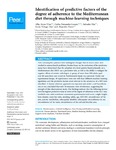Mostrar o rexistro simple do ítem
Identification of predictive factors of the degree of adherence to the Mediterranean diet through machine-learning techniques
| dc.contributor.author | Arceo-Vilas, Alba | |
| dc.contributor.author | Fernández-Lozano, Carlos | |
| dc.contributor.author | Pita, Salvador | |
| dc.contributor.author | Pértega-Díaz, Sonia | |
| dc.contributor.author | Pazos, A. | |
| dc.date.accessioned | 2020-09-23T14:29:54Z | |
| dc.date.available | 2020-09-23T14:29:54Z | |
| dc.date.issued | 2020-07-27 | |
| dc.identifier.citation | Arceo-Vilas A, Fernandez-Lozano C, Pita S, Pértega-Díaz S, Pazos A. Identification of predictive factors of the degree of adherence to the Mediterranean diet through machine-learning techniques. PeerJ Comput Sci. 2020 Jul 27;6:e287. | es_ES |
| dc.identifier.issn | 2376-5992 | |
| dc.identifier.uri | http://hdl.handle.net/2183/26233 | |
| dc.description.abstract | [Abstract] Food consumption patterns have undergone changes that in recent years have resulted in serious health problems. Studies based on the evaluation of the nutritional status have determined that the adoption of a food pattern-based primarily on a Mediterranean diet (MD) has a preventive role, as well as the ability to mitigate the negative effects of certain pathologies. A group of more than 500 adults aged over 40 years from our cohort in Northwestern Spain was surveyed. Under our experimental design, 10 experiments were run with four different machine-learning algorithms and the predictive factors most relevant to the adherence of a MD were identified. A feature selection approach was explored and under a null hypothesis test, it was concluded that only 16 measures were of relevance, suggesting the strength of this observational study. Our findings indicate that the following factors have the highest predictive value in terms of the degree of adherence to the MD: basal metabolic rate, mini nutritional assessment questionnaire total score, weight, height, bone density, waist-hip ratio, smoking habits, age, EDI-OD, circumference of the arm, activity metabolism, subscapular skinfold, subscapular circumference in cm, circumference of the waist, circumference of the calf and brachial area. | es_ES |
| dc.description.sponsorship | info:eu-repo/grantAgreement/ISCIII/Programa Estatal de Fomento de la Investigación Científica y Técnica de Excelencia/PI17%2F01826/ES/PROYECTO COLABORATIVO DE INTEGRACION DE DATOS GENOMICOS (CICLOGEN). TECNICAS DE DATA MINING Y DOCKING MOLECULAR PARA ANALISIS DE DATOS INTEGRATIVOS EN CANCER DE COLON | es_ES |
| dc.description.sponsorship | Xunta de Galicia; ED431G/01 | es_ES |
| dc.description.sponsorship | Xunta de Galicia; ED431D 2017/16 | es_ES |
| dc.description.sponsorship | Xunta de Galicia; ED431D 2017/23 | es_ES |
| dc.description.sponsorship | Xunta de Galicia; ED431C 2018/49 | es_ES |
| dc.language.iso | eng | es_ES |
| dc.publisher | PeerJ, Ltd. | es_ES |
| dc.relation.uri | https://doi.org/10.7717/peerj-cs.287 | es_ES |
| dc.rights | Creative Commons Attribution 4.0 International License (CC-BY 4.0) | es_ES |
| dc.rights.uri | http://creativecommons.org/licenses/by/4.0/ | * |
| dc.subject | Bioinformatics | es_ES |
| dc.subject | Artificial intelligence | es_ES |
| dc.subject | Data mining | es_ES |
| dc.subject | Machine learning | es_ES |
| dc.subject | Feature selection | es_ES |
| dc.subject | Nutritional status | es_ES |
| dc.subject | Machine learning | es_ES |
| dc.subject | Mediterranean diet | es_ES |
| dc.subject | Support vector machines | es_ES |
| dc.subject | Nutrition disorders | es_ES |
| dc.title | Identification of predictive factors of the degree of adherence to the Mediterranean diet through machine-learning techniques | es_ES |
| dc.type | info:eu-repo/semantics/article | es_ES |
| dc.rights.access | info:eu-repo/semantics/openAccess | es_ES |
| UDC.journalTitle | PeerJ Computer Science | es_ES |
| UDC.volume | 6 | es_ES |
| UDC.startPage | e287 | es_ES |
| dc.identifier.doi | https://doi.org/10.7717/peerj-cs.287 |
Ficheiros no ítem
Este ítem aparece na(s) seguinte(s) colección(s)
-
GI-RNASA - Artigos [195]
-
GI-GIRS - Artigos [102]






